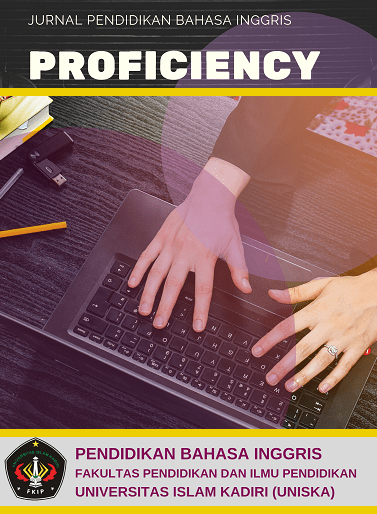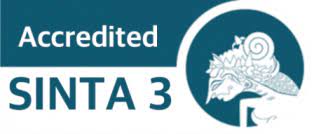ENHANCING QESTIONS FORMATION SKILLS THROUGH DEFINITIONAL QUESTION ANSWERING (DQA)
Abstract
Students often have difficulty in formulating questions that generate specific and definite answers. They lack proficiency in understanding and applying the grammatical structures and syntax required to form questions appropriately. This study aims to improve students' ability to formulate questions through the application of the Definitional Question Answering (DQA) learning method, where questions are designed to produce specific and definite answers. In this study, the experimental method was used to evaluate changes in students' abilities. The research sample consisted of 101 students majoring in management at the Faculty of Economics, Kosgoro Institute of Business and Informatics 1957 (IBIK 57). After intervention with the DQA program, a post-test was administered to assess the effectiveness of the program and students' progress. This study used an experimental design with a pre-test and post-test to evaluate the changes in students' abilities before and after the application of the DQA method. Before the application of the DQA method, all students took an initial test to measure their ability to formulate questions, comprehension of sentence elements, analytical ability, communication, and text comprehension. Thus, this study aims to contribute to improving students' skills in forming effective questions and deepening their understanding of the subject matter. The result is that the intervention or learning method that has been applied between the pre-test and post-test is effective in improving participants' performance
References
Jurafsky, D., & Martin, J. (2020). 25 - Question Answering. Speech and Language Processing, 400–458. https://www.sciencedirect.com/science/article/pii/S0925231217306665
Lee, J. F. K. (2012). Teaching Hong Kong L2 learners wh-questions-using a learning study approach. Journal of Asia TEFL, 9(1), 171–197.
Masruddin, M., & Karmila, K. (2018). Constructing WH-Questions Througn An Error Analysis at Junior High School of Indonesia. Langkawi: Journal of The Association for Arabic and English, 4(2), 123. https://doi.org/10.31332/lkw.v4i2.852
Mohammed, F. E. (2021). Question Formation Problems Encountered by Students of English as a Foreign Language: A Case Study. Journal of Humanities and Social Sciences Studies, 3(3), 12–16. https://doi.org/10.32996/jhsss.2021.3.3.2
Nurjanah, N., Anggoro, D., & Dwiastuty, N. (2018). Error Analysis of the Use of Question Words in English Sentences. Scope : Journal of English Language Teaching, 2(01), 80. https://doi.org/10.30998/scope.v2i01.2274
Prasetianto, M. (2019). Kinds of Questions Making Efl Students Learn: Students’ Perception. JOALL (Journal of Applied Linguistics & Literature), 4(2), 162–176. https://doi.org/10.33369/joall.v4i2.7607
Prasetyawati, D. (2015). Aalysis of Questions Used by English Teacher at Jakarta Intensive Learning Centre (JILC). 1–12.
Pratiwi, N. V., Sudirman, & Supriyadi, D. (2018). WH-QUESTIONS TECHNIQUE TO IMPROVE STUDENTS’ READING COMPREHENSION IN NARRATIVE TEXT Nabila Visa Pratiwi*, Sudirman, Deddy Supriyadi FKIP Universitas Lampung, Jl. Prof. Dr. Soemantri Brojonegoro No. 1. Https://Api.Core.Ac.Uk/Oai/Oai:Ojs.Jurnal.Fkip.Unila.Ac.Id:Article/15388, 1.
Rifiyanti, H. (2022). ERROR TYPES IN SUBJECT-VERB AGREEMENT. Jurnal Pendidikan Bahasa Inggris Proficiency, 4(2), 1–10.
Roeper, T., & de Villiers, J. (2011). The Acquisition Path for Wh-Questions. In Studies in Theoretical Psycholinguistics (Vol. 41, Issue August 2011). https://doi.org/10.1007/978-94-007-1688-9_6
Silalahi, R. M. (2017). Indonesian University Students’ Common Mistakes when Formulating Interrogative Sentences with Wh-questions. Celt: A Journal of Culture, English Language Teaching & Literature, 17(2), 154. https://doi.org/10.24167/celt.v17i2.568
Sujariati, S., Rahman, A. Q., & Mahmud, M. (2016). English Teacher’s Questioning Strategies in EFL Classroom at SMAN 1 Bontomarannu. ELT Worldwide: Journal of English Language Teaching, 3(1), 107. https://doi.org/10.26858/eltww.v3i1.1884
































